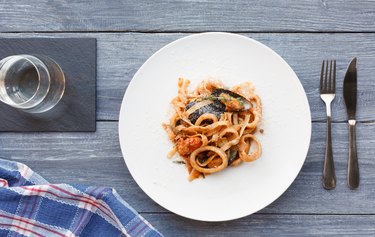
You may enjoy the fried calamari served at your favorite Italian restaurant, but you'll miss out on some of the calamari benefits if it's breaded and fried. Like other types of seafood, calamari is low in calories and high in protein and a healthy addition to any diet.
Read more: The 9 Safest Seafood Options
Video of the Day
Video of the Day
What Is Calamari?
Calamari, or calamaro, is the Italian word for squid, which may be why you automatically think of Italian restaurants when someone mentions calamari. The sea-dwelling creature is a cephalopod, like an octopus, because its head is attached to its many legs. Calamari, along with octopus, is also a type of mollusk, like clams and oysters, but without the hard shell.
According to Smithsonian Ocean, there are about 500 different types of squid that vary in size as well as taste. Calamari is one type of squid. While you may not be able to tell the difference between one species of squid over another, a culinary expert may say that the meat from calamari is more tender than other types of squid. Of course, the way you prepare your calamari, or squid, may play a role in the tenderness of your seafood.
From a nutritional standpoint, calamari benefits many aspects of your health, as long as it's not fried. According to a January 2019 prospective cohort study published in Nutrients, frequent consumption of fried food, especially fried seafood, was associated with increased risk of death in women from all causes, including heart disease.
While this study only included women, according to the authors, previous studies that included both men and women have shown a correlation between intake of fried food and increased risk of Type 2 diabetes and heart disease.
Read more: Top 10 Healthy Fish to Eat
Calamari Calories and Nutrition Facts
Like other types of seafood, calamari is low in calories and high in protein. It's also high in cholesterol. According to nutrient information provided by the USDA, a 100-gram portion of calamari, which is equal to about 3.5 ounces, contains:
- 90 calories
- 16 grams of protein
- 3 grams of carbohydrates
- 1.5 grams of total fat
- 263 milligrams of cholesterol
Not too long ago, you may have been advised to limit your intake of foods high in cholesterol like calamari due to concerns it may contribute to heart disease. However, the 2015-2020 Dietary Guidelines for Americans doesn't include recommendations for restrictions on dietary cholesterol intake. However, the Dietary Guidelines recommends that you keep your intake of dietary cholesterol as low as possible.
The current daily value for cholesterol is 300 milligrams a day. This means the 100-gram serving of calamari meets almost 90 percent of your daily needs, which may be something you need to take into consideration, especially if you have a history of heart disease or high cholesterol.
Calamari may be high in cholesterol, but it's a much better choice than the fried calamari. A 100-gram serving of fried calamari has:
- 227 calories
- 17 grams of protein
- 13 grams of carbohydrates
- 12 grams of total fat
- 239 milligrams of cholesterol
While your fried version may be a bit lower in cholesterol, it's higher in calories, fat and carbohydrates.
Calamari Benefits to Health
What are the calamari benefits when it comes to health? As long as you're eating your squid grilled, sauteed, broiled or steamed, the low-calorie, high-protein seafood can benefit your waistline.
According to an August 2018 study published in Nutrients, a high-protein weight-loss diet is better at keeping hunger pangs away than a high-carbohydrate diet. The researchers also found that when combined with exercise, adding more protein helped the participants (post-menopausal women) lose more body fat and retain more muscle mass.
While nutrient information for calamari is limited, the low-calorie mollusk is a source of many essential vitamins and minerals, including iron, calcium and vitamin A, although not a significant source of any of these nutrients. A 100-gram portion contains:
- 0.77 milligram of iron
- 20 milligrams of calcium
- 40 international units of vitamin A
Your 100-gram portion of calamari may only meet 2 percent of the daily value for calcium, but every little bit helps given that many groups in the United States (women, children and teens) get less than 50 percent of their daily needs, according to the National Institutes of Health. In addition to keeping your bones strong and healthy, calcium is also needed to regulate muscle function and nerve signaling.
- Smithsonian: "Cephalopods"
- Nutrients: "Association of Fried Food Consumption With All Cause, Cardiovascular and Cancer Mortality: Prospective Cohort Study"
- USDA FoodData Central: "Calamari"
- Food and Drug Administration: "Cholesterol"
- USDA FoodData Central: "Squid, Coated, Fried"
- Nutrients: "Effects of Adherence to a Higher Protein Diet on Weight Loss, Markers of Health, and Functional Capacity in Older Women Participating in a Resistance-Based Exercise Program"
- National Institutes of Health: Office of Dietary Supplements: "Calcium"
- Health.gov: "Dietary Guidelines for Americans, 2015-2020: Chapter 1: Key Elements of Healthy Eating Patterns"
- Smithsonian Ocean: "Giant Squid"